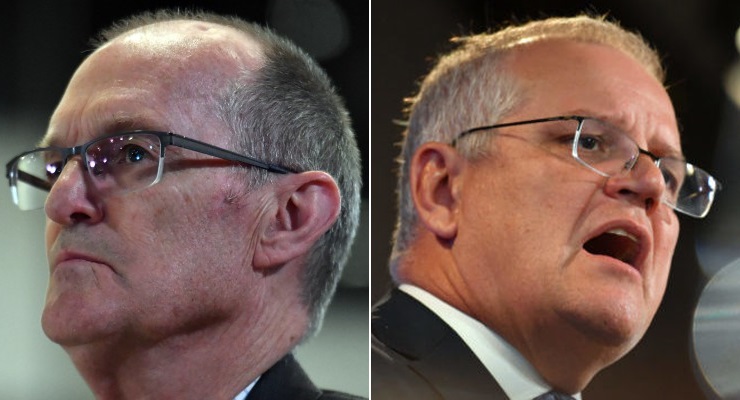
Over the years, governments have gone to great lengths to exploit cabinet-in-confidence rules to bury damaging information. Trolleys of documents have been wheeled into cabinet rooms; rogue documents stapled to the back of cabinet papers. But the Coalition stands accused of taking things much further, creating “phantom” cabinet committees for the sole purpose of enshrining government business in secrecy.
Cabinet committees are in the spotlight again after it was revealed the government was attempting to block the release of Department of Prime Minister and Cabinet (PM&C) secretary Phil Gaetjens’ report into the sports rorts by claiming it was sent to the so-called governance committee of cabinet, and therefore entitled to cabinet confidentiality.
But what is the governance committee and why was the report sent there?
‘Distorting’ the rules
Cabinet committees have been around for a long time and can serve a genuine purpose, such as allowing national security discussions to occur privately between senior cabinet ministers. They are usually made up of the prime minister and select members of cabinet.
Like the cabinet more broadly, cabinet committees are entitled to cabinet-in-confidence rules, meaning documents and discussions can remain secret for up to 30 years at the government’s discretion.
But at least two committees have been singled out by Labor, independent Senator Rex Patrick and some legal experts as being used solely to bury bad news.
“What we are seeing is a distortion of the constitutional system in order to achieve secrecy,” constitutional law professor at the University of Sydney Anne Twomey tells Crikey.
“They are taking a system that is there for legitimate reasons but they are distorting it to achieve a lack of accountability, and that is problematic,” she said.
The governance committee
The governance committee, set up under the Abbott government, is made up of Prime Minister Scott Morrison, Deputy Prime Minister Barnaby Joyce, Treasurer Josh Frydenberg and Attorney-General Michaelia Cash. At the time of the sports rorts, it included then deputy prime minister Michael McCormack and then attorney-general Christian Porter.
According to the PM&C, its role is to provide “advice and oversight of governance and integrity issues, which include, but are not limited to, the statement of ministerial standards and issues arising from the lobbyist code”. But Patrick has questioned the need for the cabinet to deal with such issues, saying it was being used to rubber stamp information “confidential”.
“The whole purpose [of this committee] is to hamper transparency,” he told Crikey. “It is a committee for [burying] embarrassing government trash.
“The reason [the PM] has created this committee is so that he can have reports such as the sports rort report sent to cabinet for the purpose of keeping it secret.”
The one-man committee
Another so-called phantom committee, the cabinet office policy committee, sparked controversy when it was revealed the only permanent member was Morrison.
The PM&C says the committee’s role is to consider “major policy issues on an as needs basis, including early stage consideration of strategic issues, specialist advice on nationally significant issues and rapidly evolving situations”.
But Labor has said this is an abuse of process that enables Morrison to call meetings protected by cabinet confidentiality, even if no other cabinet members are present.
“You use these conventions to cover up blatant political decision-making,” Labor’s Penny Wong accused former finance minister Mathias Cormann in an estimates hearing last year. “[It’s] yet another Morrison government cover-up.”
Whether or not these committees serve a true purpose is likely to remain unclear given their opaque nature. But Stephen Bartos, a governance expert and the former deputy secretary of the Finance Department, said that while the Morrison government was not the first to exploit cabinet-in-confidence, the nature of the committees deserves scrutiny.
“What is problematic is that they’re using committees in a fairly political way to try to conceal information that they believe might be politically embarrassing,” he said.
In the instance of the sports rorts report, which was supposed to clear the government of wrongdoing, keeping it hidden is a puzzling strategy.
It may not be the first government to exploit cabinet-in-confidence rules, but it’s certainly gone gangbusters on it. Let us know what you think by writing to letters@crikey.com.au. Include your full name if you’d like to be considered for publication.








Crikey is committed to hosting lively discussions. Help us keep the conversation useful, interesting and welcoming. We aim to publish comments quickly in the interest of promoting robust conversation, but we’re a small team and we deploy filters to protect against legal risk. Occasionally your comment may be held up while we review, but we’re working as fast as we can to keep the conversation rolling.
The Crikey comment section is members-only content. Please subscribe to leave a comment.
The Crikey comment section is members-only content. Please login to leave a comment.